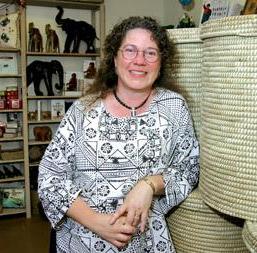Linked with Ten-Thousand-Villages.
She is one of the 1000 women proposed for the Nobel Peace Price 2005.
Candi Smucker believes the workers of the world deserve to earn a sustaining wage. And she knows that there are many shoppers who want to purchase goods that benefit the people who created them. Her first belief is grounded in humanitarianism; the second comes from solid experience. Her success as a retail manager for bookstores and fair trade gift stores prompted her to begin working with Ten Thousand Villages, a job creation program for third world artisans. She spearheaded the creation of five stores, authored a training manual, and trained 150 ‘Ten-Thousand-Villages’-storeowners. (1000peacewomen).
She says: « Fair trade plays by a different set of rules than normal commerce. Instead of exchanging goods or services based on clout and driving hard bargains, it is based on economic and social justice ».
Sonoma Handcrafts Store has a Gift for Saving Energy, Money and the Environment. Download also the Success Story: Baksheesh – Handcrafted Gifts from the Developing World.
. .
.
Candi Smucker – USA
She works for Ten-Thousand-Villages.
She says also: … « The Nobel Peace Prize is awarded for big things and big things are wonderful, but where change really happens is when multiple people do small acts over and over again. This project honors all those small acts. … It is many people doing small things that makes the biggest difference for world peace » … (full text).
Small businesses cut costs by conserving resources.
… Fair trade activist and 2005 Nobel Peace Prize nominee Candi Smucker spoke to a group of five students and community members about the importance of fair trade in room 225 at the Dr. Martin Luther King Jr. Library on Monday … (full text).
Further she says: … Awareness of that potential is crucial, says Candi Smucker, co-owner of Baksheesh fair trade stores in Sonoma and Healdsburg (a St. Helena location opens later this month). « Fair trade » means the weavers, seamstresses and others artisans are guaranteed to earn a living wage in their country. Smucker says it’s possible to develop a healthy fashion conscience in small, do-able increments. « The first step is to just read the label, » Smucker explains. « It doesn’t mean buy it or don’t buy it; it just means educate yourself about where it’s from. » Next, ask the sales clerk what the company’s policy is on clothing made in a particular country. « The clerk won’t know, » Smucker adds wryly. « If you’re really into it, ask who in the company would know. And if you’re really, really into it, don’t buy it » … (full text).
The Candi Smucker Sermon – First Congregational Church, Sonoma, CA, September 18, 2005, Readings: Psalm 145: 8 – 21, Matthew 20: 1 – 16, 6 pdf pages.
And she says: … « While I love the opportunity this gives each of us to promote the causes that are dear to our hearts, for this project to win the Nobel Peace Prize would give tremendous encouragement to the millions of women who are doing small things for peace. The little things do count » … (full text).
Baksheesh celebrates with open house.
Candi and Brian Smucker run an international bazaar with hand-crafted items from 35 countries in their 600-square-foot store on Sonoma’s plaza. Nothing sold in Baksheesh is made in an overseas sweatshop. « We’re sort of Cost Plus with a conscience, » Candi Smucker said. Their store brims with decorative items for Christmas, such as star garlands of woven palm leaf from Bangladesh, in red, natural, or blue and gold … (full text).
With all the hullabaloo over the presentation of the 2005 Nobel Peace Prize (congratulations, Mohammed El-Baradei!), here’s a local story that was overlooked. For the first time, the nominees for the prestigious prize included the names of 1,000 women — 40 from the US and 14 from the Bay Area … (full text).
links:
UNITED CHURCH NEWS, THE PACIFIC/OCTOBER-NOVEMBER 2005;
